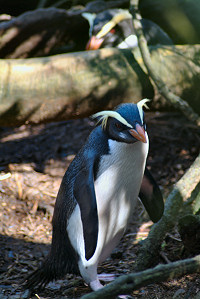Fiordland crested penguin
| Fiordland penguin | |
|---|---|
 |
|
| Scientific classification | |
| Kingdom: | Animalia |
| Phylum: | Chordata |
| Class: | Aves |
| Order: | Sphenisciformes |
| Family: | Spheniscidae |
| Genus: | Eudyptes |
| Species: | E. pachyrhynchus |
| Binomial name | |
|
Eudyptes pachyrhynchus G. R. Gray, 1845 |
|
 |
|
| Current breeding range | |
The Fiordland penguin (Eudyptes pachyrhynchus), also known as the Fiordland crested penguin (in Māori, tawaki or pokotiwha), is a crested penguin species endemic to New Zealand. It currently breeds along the south-western coasts of New Zealand's South Island as well as on Stewart Island/Rakiura and its outlying islands. Because it originally ranged beyond Fiordland, it is sometimes referred to as the New Zealand crested penguin.
The Fiordland crested penguin was described in 1845 by English zoologist George Robert Gray, its specific epithet derived from the Ancient Greek pachy-/παχυ- "thick" and rhynchos/ρύγχος "beak". It is one of six species in the genus Eudyptes, the generic name derived from the Ancient Greek eu/ευ "good" and dyptes/δύπτης "diver".
This species is a medium-sized, yellow-crested, black-and-white penguin, growing to approximately 60 cm (24 in) long and weighing on average 3.7 kg (8.2 lb), with a weight range of 2 to 5.95 kg (4.4 to 13.1 lb). It has dark, bluish-grey upperparts with a darker head, and white underparts. Its broad, yellow eyebrow-stripe extends over the eye and drops down the neck. It can be distinguished from the similar erect-crested penguin (Eudyptes sclateri) and Snares crested penguin (Eudyptes robustus) in having no bare skin around the base of its bill.
This penguin nests in colonies among tree roots and rocks in dense temperate coastal forest. It breeds along the shores the West Coast of the South Island south of about Bruce Bay and the Open Bay Islands, around Fiordland and Foveaux Strait, and on Stewart Island/Rakiura and its outlying islands. Fossils of this species have been found as far north as the northern end of the South Island, and they probably once nested in the North Island as well. Their range has been drastically reduced by hunting in Polynesian times, and they are now only found in the least-populated part of New Zealand.
...
Wikipedia


